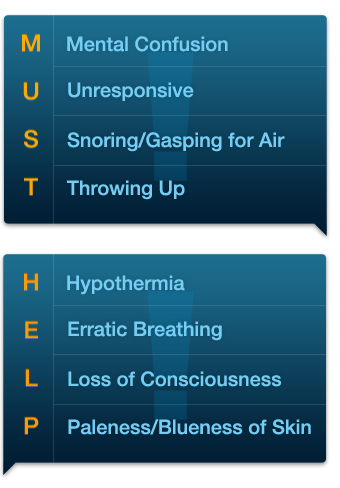Alcohol Overdose and the Recovery Position
If the person is unconscious, semi-conscious or unresponsive, check for these symptoms of alcohol or drug overdose:
- Cannot be roused and are unresponsive.
- Skin is cold, clammy, pale, bluish and/or blotchy.
- Breathing is slow.
- Experience lapses in breathing - more than 10 seconds between breaths.
- Experience seizures, convulsions or rigid spasms.
- Vomits while asleep or unconscious and does not awaken.
When in doubt, remember MUST HELP:

Courtesy of Aware, Awake, Alive
If any of these symptoms of alcohol overdose exist, call 911 for help, and stay with them while waiting for emergency personnel:
- Gently turn them onto their side and into the recovery position.
- Don't leave them alone at any time and be prepared to administer CPR.
If they are conscious and responsive:
- Check often to make sure they are still conscious and responsive.
- Before you touch them, tell them exactly what you are going to do.
- Gently turn them onto their side and into the recovery position.
- Remain calm and be firm. Avoid communicating feelings of anxiety or anger.
- Keep them quiet and comfortable.
- Don't give them food, drink or medication of any kind.
- Remember that only time will sober up someone who has been drinking. Walking, showering or drinking coffee will not help and may actually cause harm.
- UT Austin students, staff and faculty can refer an individual to the Sobering Center of Austin/Travis County by calling 512-957-1900. The Sobering Center provides a safe, no-cost location for publicly intoxicated individuals to sober up. Learn more about the Sobering Center.
What can happen if an alcohol overdose goes untreated?
- A person could choke on their vomit.
- Breathing may slow down, become irregular and stop.
- Heart may beat irregularly and stop.
- Hypothermia (low body temperature).
- Hypoglycemia (low blood sugar), which can lead to seizures.
- Severe dehydration from vomiting, which can cause seizures, permanent brain damage or death.
Seek medical help for a friend who has had too much to drink. Current UT students can avoid formal University disciplinary action and the creation of a formal disciplinary record when they call for help for an alcohol or drug-related medical emergency due to UT’s Student Amnesty for Alcohol and Drug Emergencies.
The Recovery Position
1. Raise the arm that is closest to you above their head. Prepare to roll them towards you.

2. Gently roll them toward you, guarding their head from hitting the floor. The head should rest in front of the arm, not on it.

3. Tilt the head up to maintain airway. Tuck their nearest hand under the cheek to help maintain head tilt and raise the face off the floor.

4. Check on them often.


